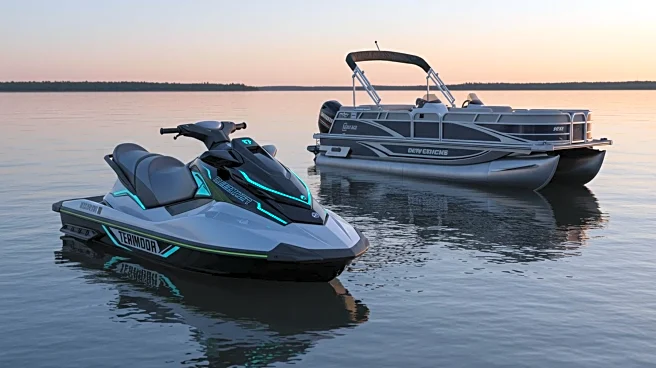What's Happening?
Sea-Doo, a brand under BRP Inc., has announced significant upgrades to its personal watercraft (PWC) and pontoon lineup for 2026. The enhancements include the introduction of a 300 hp supercharged Rotax 1630 ACE engine to various configurations of the Sea-Doo Switch family, increasing power and performance. Additionally, Sea-Doo is expanding its connectivity features with a 10.25'' Touchscreen Display, offering customizable smart functions such as driving stats, marine navigation, and music. This display, first introduced on the 2025 GTX Limited 325, is now standard on several 2026 models, enhancing the user experience with features like Launch Mode and Ski Mode. The Switch family also sees improvements with larger fuel tanks and ergonomic upgrades, such as tilting handlebars and depth finder access.
Why It's Important?
These advancements by Sea-Doo reflect a growing trend in the powersports industry towards integrating technology and enhancing user experience. The increased horsepower and connectivity features cater to a diverse range of consumers, from thrill-seekers to families looking for recreational activities. The enhancements could lead to increased sales and market share for BRP Inc., as they offer more versatile and technologically advanced products. The focus on connectivity and user-friendly features may also set a new standard in the industry, pushing competitors to innovate similarly.
What's Next?
Sea-Doo's continuous improvements suggest a commitment to innovation and customer satisfaction. The company may continue to develop new technologies and features to maintain its competitive edge. As the 2026 models roll out, consumer feedback will likely influence future upgrades and product development. Additionally, BRP Inc.'s focus on electric models indicates a potential shift towards more sustainable options in the powersports market.
Beyond the Headlines
The integration of advanced technology in recreational vehicles raises questions about data privacy and security, especially with features like GPS tracking and smart connectivity. As these technologies become more prevalent, manufacturers may need to address potential concerns regarding user data protection. Furthermore, the emphasis on high-performance engines and connectivity could influence cultural perceptions of recreational activities, promoting a more tech-savvy and environmentally conscious approach.










